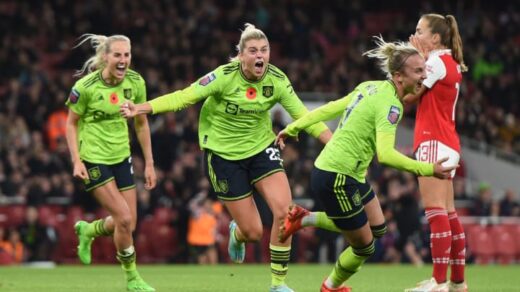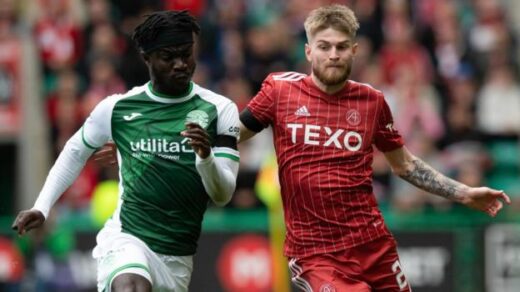“And your little brother made quite an impact.”
“Well, ‘little‘ …”
It is late in Pamplona, and Federico Valverde is laughing. Real Madrid have just defeated Osasuna 2-0 at El Sadar, the original hard place to go. Under pressure, they have found a way to win, which is very much their way. “I feel like I have seen this movie before,” sighs the Osasuna manager Jagoba Arrasate afterwards, an inevitability about it all, but if the film is familiar, the kid taking over the final scene is not. Not yet. He will be, though, and fast.
This was not just a cameo, Carlo Ancelotti says.
– Stream on ESPN+: LaLiga, Bundesliga, more (U.S.)
With seven minutes to go, Real Madrid’s manager sends on a tall, slightly clunky-looking 18-year-old. His name is Alvaro Rodriguez and he has played just 23 unremarkable minutes all season — against third-tier Cacereno in the Copa del Rey. He has played 15 times for Castilla, Madrid’s B team, scoring five times, and has just come back from the U20 World Cup. He has five goals in six games for Uruguay. “He’s tall, good in the air, a profile we don’t have,” Ancelotti explains before the game, pass notes for those who haven’t seen him play, which is most people.
Seven minutes later, when he comes off at full-time, Alvaro has provided two assists and Madrid have won. Never mind that one was disallowed for offside, the impact is huge. And anyway, the other is decisive. Tall, good in the air, you say? Instead, he makes the tackle and plays an impeccable pass for the second goal, victory finally secure. There’s a smoothness that belies that big frame and a calmness that, at the risk of cliché, belies his age. In a place like this, too. Most players in his position would not have the tranquility or the selflessness, Ancelotti says.
At 18 years, 219 days, he is the second-youngest player ever to provide an assist for Real Madrid. Only a Javi Garcia pass for Michael Owen beats it.
No wonder Valverde, the fellow Uruguayan who has taken it upon himself to look after Alvaro, is beaming. He couldn’t be happier for his not-so-little brother.
Outside El Sadar, by the team bus, Alvaro’s mum, Pilar, is waiting to see her son. Travel arranged in a hurry — absences in the team are what finally opened the door, earlier than expected — what everyone else sees as the start of something feels like the culmination to her, more aware than anyone of how far they have come. Eventually, he strolls through the glass doors, just a teenager in a tracksuit. Feet on the ground, she keeps saying.
It’s not that easy. His previous game was against Linares. His next game is against Liverpool. He doesn’t play at Anfield — although he does get Darwin Nunez‘s shirt — but he plays at the Santiago Bernabeu seven days later. It is not the first time he has been here — there’s a neat photo of him sitting in the press room as a kid having done the stadium tour a few years before — but it is the first time he has played here. He comes on for 13 minutes in the derbi against Atletico Madrid. And scores.
Tall and good in the air, you say? Towering above the Atletico defence, which is not a defence you’re supposed to be able to tower over, he heads in an equaliser. He has been on the pitch seven minutes. He’s not hanging about, instead running back to restart, seeking a winner. His mum hasn’t made it this time, but in the south stand his agent Joyce Moreno — who began his own career at Real Madrid and made his own first-division debut at Real Oviedo — starts to cry. Three players this century have scored goals earlier than his client: Alvaro Morata, Vinicius Junior and Borja Mayoral. This is not ultra-precocious, but it’s pretty damn good.
After the game, Alvaro heads back to the residency at Valdebebas, where he shares a room with Miguel Angel, who plays for the U19s. The first thing Alvaro asks Moreno about, the agent tells Cadena Ser, is Castilla. They’re still his team, too.
Feet on the ground. There is warning in those names: Vinicius is flying, Morata is a Spain international, now across town, and Javi Garcia and Borja Mayoral built and are building careers. And it is worth remembering something all too easily forgotten by all of us: the worst player you have ever seen play in primera is bloody brilliant, blessed with a talent you could only dream of. And nothing comes for free. Making it at Madrid is different, though. At times it can feel like the last thing a player should do is assume that he will, or listen when others say it for him; even worse, to believe he already has.
Exaggeration comes easily. “A star is born,” one headline read this week. But here’s a lyric from Nick Cave (who knew, eh?): The stars will explode in the sky. But they don’t, do they? Stars have their moment and then they die. That might be a little overly morose but all that noise doesn’t always help. Sometimes the spotlight doesn’t either, all the reports written about players, the scramble to tell their stories — sorry about that — and plenty of players have appeared only to disappear again.
And yet … and yet … it’s human to believe, to want to believe. And there is something there, something a little different about him. Something to hold on to; you can see something. Ancelotti can anyway. The fact that he says so is in itself encouraging: he has seen a few players, after all, and he is calmness personified, not someone who shouts for the sake of it. “Alvaro has qualities few players have,” the Italian manager says.
Alvaro’s goal is against Atletico, which makes the comparisons inevitable, too. Atletico were the team Raul Gonzalez Blanco scored his first goal against, and in only his second game, way back in October 1994. And here’s the thing: Raul, everyone says, is Alvaro’s idol. Growing up, Alvaro caught only the final years of Raul’s career — he was born in July 2004, and Raul left Madrid in 2010 — but his father admired Madrid and the calendar on his wall was Raul.
Now Raul is in charge of Castilla. He is a symbol of seriousness, mental strength, dedication day after day after day; as role models go, it doesn’t get much better and he couldn’t be much closer. It was Madrid’s former captain and top career scorer (until Cristiano Ronaldo broke his record) who saw something in Alvaro — a header the likes of which he had not witnessed before — and fast-tracked him into the team. It is Raul who will now share his development with the first team. After all, although promotion helps, so do minutes.
“We will talk to Raul and decide what’s best for him,” Ancelotti said. Those are two pretty good guides, men not prone to getting carried away.
There are others: mum, stepfather and grandmother. Alvaro’s father, Coquito Rodriguez, was a Uruguayan footballer whose career started even sooner — he made his debut at Penarol aged 14 — and ended in Palamos, Catalonia. There he set up a club called Global Palamos, where Alvaro began. There were videos, lessons, practice and a trial at Real Madrid. Well, there was supposed to be.
The letter came in 2017, inviting Alvaro to Valdebebas, a nice little detail revealed by Marca in the week after his goal against Atletico, as the excitement around him built: come with boots, moulded studs, sports socks (preferably white) and a towel, the letter said, but not in Real Madrid kit, to avoid confusion. The problem was that Girona, the club where he had started training, did not give him permission to go and so he had to wait, eventually arriving in 2020.
This time, he stayed. How much longer remains to be seen, but there’s a pathway there now. One day, Raul said, he saw Alvaro score the kind of header you just don’t see a kid score. Within a fortnight, he had him in the Castilla team, leaping two stages at once. Last week, he was called up to the first team. Next season, that move will be made permanent. For now he will play for both, third tier and the top together.
“He’s going to be an important player for many years,” Ancelotti says.



